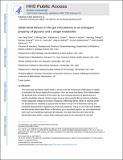Strain-level fitness in the gut microbiome is an emergent property of glycans and a single metabolite
Author(s)
Park, Sun-Yang; Rao, Chitong; Coyte, Katharine Z; Kuziel, Gavin A; Zhang, Yancong; Huang, Wentao; Franzosa, Eric A; Weng, Jing-Ke; Huttenhower, Curtis; Rakoff-Nahoum, Seth; ... Show more Show less
DownloadAccepted version (2.696Mb)
Publisher with Creative Commons License
Publisher with Creative Commons License
Creative Commons Attribution
Terms of use
Metadata
Show full item recordAbstract
The human gut microbiota resides within a diverse chemical environment challenging our ability to understand the forces shaping this ecosystem. Here, we reveal that fitness of the Bacteroidales, the dominant order of bacteria in the human gut, is an emergent property of glycans and one specific metabolite, butyrate. Distinct sugars serve as strain-variable fitness switches activating context-dependent inhibitory functions of butyrate. Differential fitness effects of butyrate within the Bacteroides are mediated by species-level variation in Acyl-CoA thioesterase activity and nucleotide polymorphisms regulating an Acyl-CoA transferase. Using in vivo multi-omic profiles, we demonstrate Bacteroides fitness in the human gut is associated together, but not independently, with Acyl-CoA transferase expression and butyrate. Our data reveal that each strain of the Bacteroides exists within a unique fitness landscape based on the interaction of chemical components unpredictable by the effect of each part alone mediated by flexibility in the core genome.
Date issued
2022Department
Massachusetts Institute of Technology. Department of Biology; Whitehead Institute for Biomedical ResearchJournal
Cell
Publisher
Elsevier BV
Citation
Park, Sun-Yang, Rao, Chitong, Coyte, Katharine Z, Kuziel, Gavin A, Zhang, Yancong et al. 2022. "Strain-level fitness in the gut microbiome is an emergent property of glycans and a single metabolite." Cell, 185 (3).
Version: Author's final manuscript